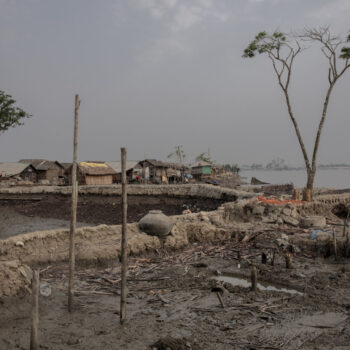FMO (the Netherlands Development Finance Company) opened public consultation on its draft ‘Position Statement on Phasing Out Fossil Fuels in Direct Investments’.
E3G welcomes the proposed position’s exclusion of coal, Heavy Fuel Oil (HFO), and Life Cycle Oil (LCO). However, E3G notes that FMO – be it conditionally – allows for new direct investments in gas-based power generation and distributed energy under restrictive transition conditions.
E3G recommends FMO cease to investment in gas altogether for the reasons stated below and instead focus on enabling alternative, “best-of-a-kind” solutions to come forward.
Why tackle gas now?
First, scenarios aligned with the Paris Agreement (1.5°C, no overshoot) largely require today’s global gas demand to decrease, not increase, by 2030, implying a decrease in gas consumption in many developing country markets.
Second, as of 2019, gas is the leading contributor to global fossil emissions – whilst coal emissions are declining.
Third, out of the 100-methane leakage hot spots worldwide, 50 are associated with oil and gas production. Carbon footprint and shadow carbon pricing methodologies used by multilateral development banks (MDBs) and development finance institutions (DFIs) often neglects these upstream – Scope 3 – emissions and uses conservative assumptions around the global warming potential of fossil gas.
Fourth, to achieve the agreement’s 1.5°C temperature goal, global coal-fired power generation must be reduced 80 percent below 2010 levels by 2030 and requires replacing the power with portfolios of clean energy resources. However, replacement of this generation with fossil gas will not achieve the necessary reductions, and as the costs of renewables fall below the cost of gas, there is a risk of replacing one uncompetitive energy source with another.
Lastly, newly installed renewable power capacity increasingly costs less than the cheapest power generation options based on fossil fuels. Solar PV – community, for example, can deliver power at $73 to $145 a megawatt-hour, according to the investment firm Lazard. By comparison, natural gas peaking plants, which utilities can turn on and off quickly to meet surging demand, deliver power at $152 to $206 a megawatt-hour.
Debunking the technical issues for supporting gas
The position statement states that for developing countries fossil fuels – in reference to gas – “are at times required to build a reliable electricity sector and to improve the access to energy in these countries”. E3G believes that there are four compelling reasons why gas is not a bridge to a safe climate:
- Gas is not a transition fuel: Climate goals require the energy sector to be decarbonised by mid-century. This means that both coal and gas must be phased out. Replacing coal plants with new gas plants will not cut emissions by nearly enough, even if methane leakage is kept to a minimum.
- Gas is not essential for grid reliability: The position paper refers to grid stabilisation under ‘Transition criteria 3’ for gas-based power generation. This capacity does not need to come from gas plants because of the rapid and widespread uptake of renewable generators worldwide. While wind and solar require balancing, gas is neither the only, nor the best, resource available for doing so. Portugal, for example, has already operated a whole month on 100% renewables. The renewable generation reduced Portugal’s carbon dioxide emissions by 1.8 million tons and helped the country’s export balance. Furthermore, the economic case for building new coal and gas capacity is crumbling, as batteries start to encroach on the flexibility and peaking revenues enjoyed by fossil fuel plants. Additionally, wind and solar plants that are coupled with battery storage are becoming a competitive “dispatchable” source of energy. BNEF reports that wind and solar plants with onsite battery storage are already able to compete with new coal or gas plants on a levelized cost of energy (LCOE) basis in Germany, the United Kingdom, China, Australia, and the United States and can be operated in ways to provide grid services. The main remaining challenge is that of seasonal balancing.
- Fossil gas is not cheaper than renewables: The dramatic and ongoing cost declines for wind and solar disrupt the business model for gas in the power sector. While cost has been a constraint in the past, today, wind and solar are the cheapest forms of bulk energy supply in most major markets. In fact, renewables will become cheaper than existing coal and gas in most regions before 2030, including countries, but not limited to, China, India, Vietnam, Egypt, and Saudi Arabia. Which means renewables can help support the development of developing countries. PFIs instead have an important role to play in bringing down cost of capital and risk mitigation around wind and solar in emerging markets.
- Environmental impact of gas is underestimated: The licenses, permits, sunk capital, and related infrastructure that go into developing extraction projects create a “carbon lock-in” effect, meaning the oil, gas, and coal will be more politically, legally, and economically difficult to leave in the ground, compared to reserves that have not yet been developed. The implication of this is clear: there is no room for new fossil fuel development – gas included – within the Paris Agreement goals. Achieving the Paris goals will require governments to proactively manage the decline of all fossil fuels together. But stopping new projects alone will not be enough to keep warming well within 1.5°C target. Governments must also phase out a significant number of existing projects ahead of schedule.
Understanding gas investments face risk
Price declines in renewables have transformed energy options in the past decade. Energy costs are set to shift again in the coming decade, creating wide-reaching financial risks for gas investments – upstream, midstream, and downstream.
For FMO, policy and regulatory risks would be particularly material. For example, energy regulators in France and Spain refused permission for the construction of the Midi-Catalonia cross-border gas pipeline because it was deemed unnecessary and too expensive.
Analysis showed the pipeline would deliver little economic value to either country.
Regarding developing countries, gas imports can become a strain on public budgets if import prices exceed local ability to pay, and subsidies become necessary. When renewables start undercutting existing gas power plants, utilities, underwritten by public funds, could suffer a similar shock as Eskom in South Africa as a result of coal over-investment.
Going further, price volatility can potentially cause national budget deficit. In turn, this could lead to a failure in meeting existing obligations such as, but not limited to, salaries and pensions. Decreased export revenues impact overall trade balances which would exert downward pressure on local currencies. As a result, foreign exchange reserves get used to maintain currency stability.
Aligning with the Paris Agreement
Expansion of gas demand in the long term is not compatible with a 1.5°C degree pathway. Many parts of the supply chain are also exposed to significant financial risk or come with development or social disbenefits.
For many parts of the gas value chain this means it is hard to make a case that gas use is Paris-aligned or supports economic development – this includes upstream, most midstream, and end uses such as power generation and heating in buildings.
E3G understands that in July 2019, FMO signed the Dutch Climate Accord, with the intention to start reporting on their climate impact from 2020 and will announce their action plans, including reduction targets, by no later than 2022, both for domestic and international investments.
Against this backdrop, FMO should cease to invest in gas altogether and instead focus on enabling alternative, “best-of-a-kind” solutions to come forward.
Any exemptions should be governed by clear decision-trees and Emissions Performance Standards that can respond to evolving technologies, science and local context. In this context, proposed gas projects must:
- demonstrate why the identified development could not be met by net-zero energy technologies and why the latest insights on 100% renewables grid operation can’t be applied in a given context.
- demonstrate that the project could not be replaced with alternatives more cheaply.
- evaluate the risk of asset-stranding or future unprofitability given technological development and regulatory risks
- showcase compatibility with the Paris Agreement.
When considering investments in gas-based power generation, E3G recommends that FMO adopts and applies the abovementioned conditions instead of the criteria prescribed in its draft position statement.
Decommissioning of gas infrastructure or “early retirement and replacement” projects may be added to the exemptions if they accelerate the phaseout.
Download the full consultation response here.


